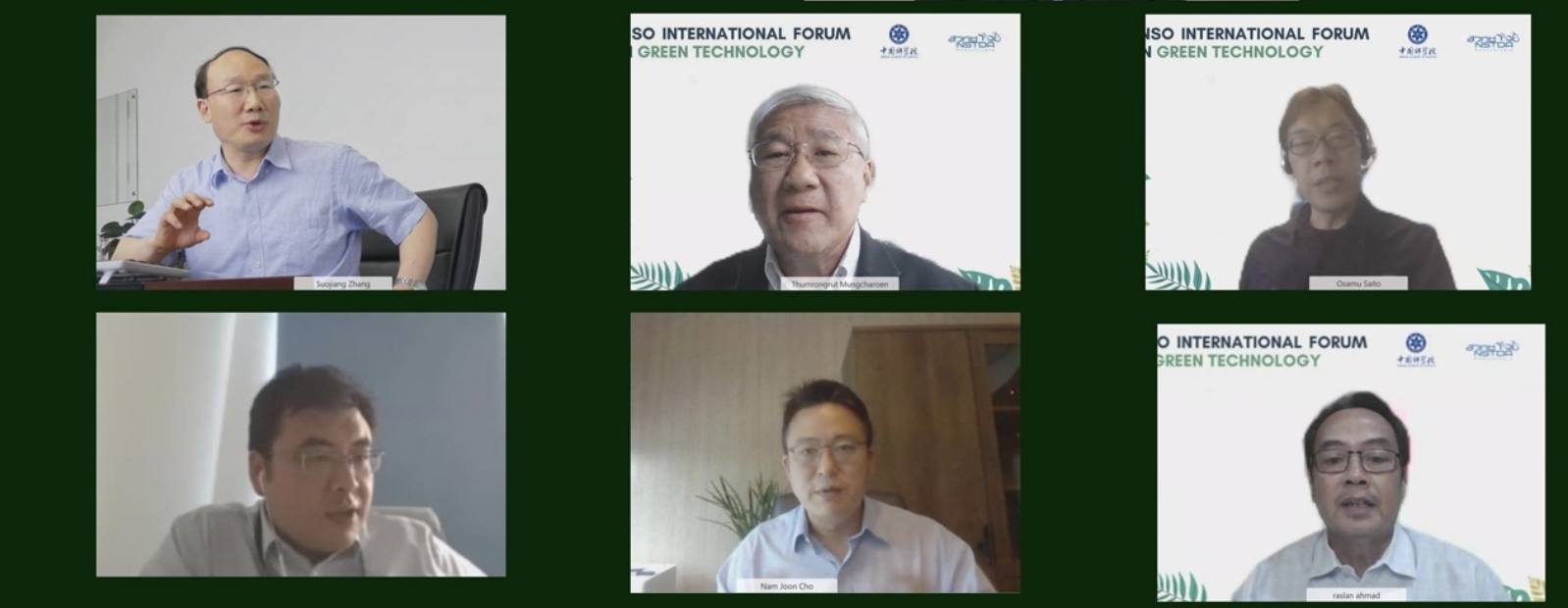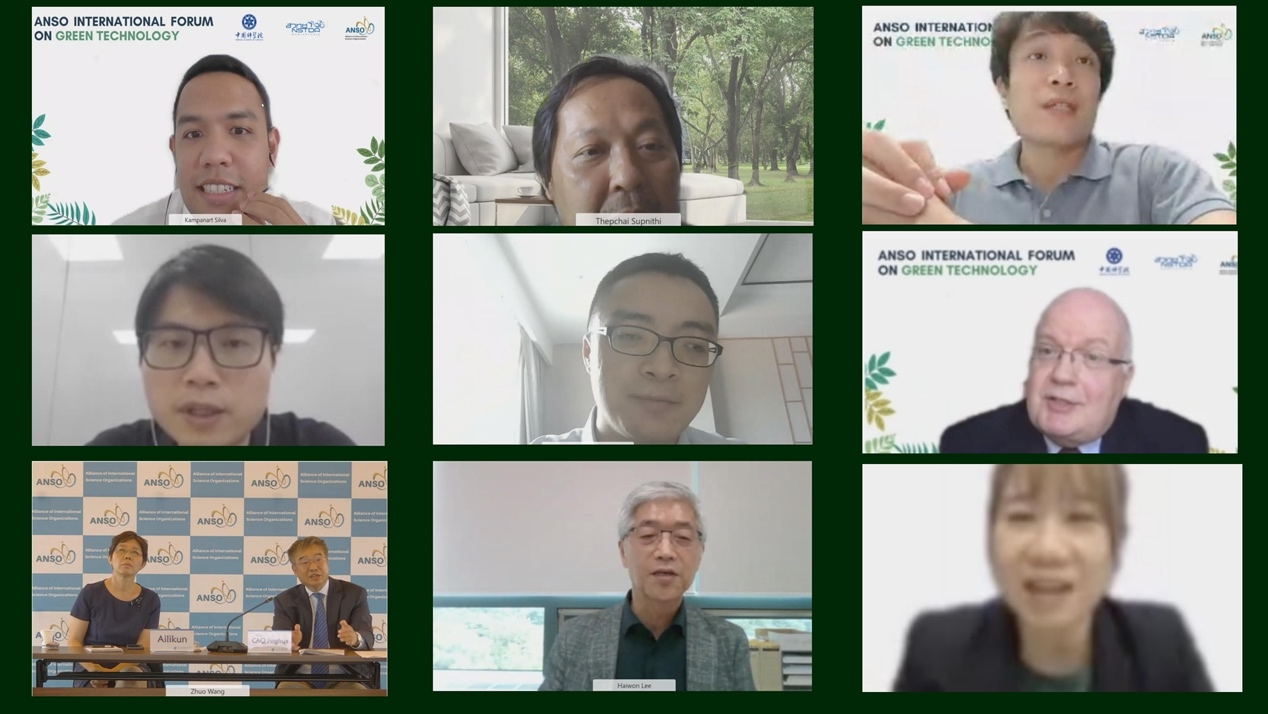Along with the rapid socioeconomic development, there has been a worsening of the eco-environment challenge and an increasing need to address it globally. To explore and find solutions to addressing the challenge, the ANSO International Forum for Green Technology was held on 11 June according to the decision made by the ANSO Governing Board last year. With the strong support of the Chinese Academy of Sciences (CAS) and Thailand’s National Science and Technology Development Agency (NSTDA), this workshop went very well. Centering on the concept of maintaining sustainable environmental balance, the workshop invited more than 20 top-level scientists from various parts of the world to discuss the newest development and options in green technology and circular economy to address the said challenge. The live stream of the workshop indicated the participation of over 500 people.
Prof. Narong Sirilertworakul, President of NSTDA and Prof. Chunli Bai, President of ANSO kicked off the meeting by offering warm welcomes to all the invited speakers and participants, both emphasized the importance and the urgency of developing and application of green technologies to address this common challenge we all face. Obviously, global joint efforts are needed to develop renewable energy, green technologies and to achieve decarbonization at all front. This is especially applied to the rapid economic growth countries and regions.
The first session for the webinar focused on circular economy and biotechnology. Academician Suojiang Zhang, Director, Professor of the Institute of Process Engineering, CAS gave the first talk. He emphasized the great urgency for carbon emission reduction, and elaborated a number of green technology approaches such as the full use of waste biomass, cellulose dissolution as an efficient way to achieve carbon neutrality. The next speaker, Dr. Thumrongrut Mungcharoen, Senior Advisor of the NSTDA, presented the story of Thailand of using circular economy as a systematic reform to reduce the country’s resource consumption. In his eyes, circular economy can help to tackle problems such as waste, and an overuse of resources and to improve productivity. It brings all the stakeholders together to improve the quality of life and better economic growth. Dr. Raslan Ahmad, Senior Vice President, Malaysian Industry-Government Group for High Technology (MIGHT), Ministry of Science, Technology and Innovation of Malaysia introduced the MIGHT’s actions on tackling existing unsustainable ways of growth and practices. Creating a national-level policy framework is critical for a country to transform towards circular economy, he argued. Prof. Saito Osamu, Principal Policy Researcher of the Institute for Global Environmental Strategies introduced several scenarios and models under the framework of Intergovernmental Panel on Climate Change and proposed that the trade-off between resource use, climate change mitigation and ecosystem conservation as the biggest concern in promoting circular economy and nature-based solutions. Prof. Cho Nam-Joon, Chair of the School of Materials Science and Engineering, Nanyang Technological University agreed with Prof. Saito’s opinion. He meanwhile stressed that the development of sustainable technology is a global issue and efforts from any country are of great importance.
The second session of the conference deemed clean energy as a vital path to net zero emission. Prof. Zheng Wang, the Research Center for Eco-Environmental Sciences, CAS, started the session by introducing a few viable energy resources that utilize CO2 and mitigate the effects of climate change such as artificial photocatalytic overall reaction of CO2 reduction, water oxidation and water splitting driven by visible light. Dr. Kampanart Silva, Researcher of the Renewable Energy and Energy Efficiency Research Team, National Energy Technology Center (ENTEC) introduced ENTEC’s pilot projects which aims to solve problems of sustainable energy. Next, Prof. Peter Lund from the School of Science of Aalto University expressed the Europe’s determination to achieve decarbonization by the year 2050 using systems-embedded clean energies. Prof. Nannan Sun of Shanghai Advanced Research Institute (SARI), CAS indicated that CO2 capture utilization and Storage is an enabler for the sustainable use of carbon-based energy, which will be an important technology for CO2 reduction.
Artificial Intelligence (AI) is also important for green society and creative economy. Mr. Yuan Liu, Leader of Cainiao Packaging Department, and Mr. Liang Dezhi, Senior Solution Architect of Huawei Cloud EI, both aired the corporations’ approaches to green technologies using AI. Tons of CO2 was saved by their creative methods. Dr. Thepchai Supnithi, Principal Researcher and Director of the Artificial Intelligence Research Group, National Electronics and Computer Technology Center (ENCTEC) presented a system of museums organized by the NECTEC that aims to increase the awareness of preserving biodiversity and its recognition by utilizing the power of the local community.
The meeting reached its end with two closing speeches by Prof. Jinghua Cao, Executive Director of the ANSO Secretariat and Dr. Lily Eurwilaichitr, Vice President of NSTDA. Prof. Jinghua Cao emphasized China’s determination to implement national strategies to achieve carbon peak by 2030 and carbon neutrality by 2060. He expects a wider collaboration between China and ASEAN countries to develop circular economy. Dr. Lily Eurwilaichit agreed that much less will be accomplished without international cooperation. China and Thailand are determined to address the carbon challenge and to achieve sustainable development. She is also confident of the future perspective of international cooperation as ANSO has set up a good example in that regard.



